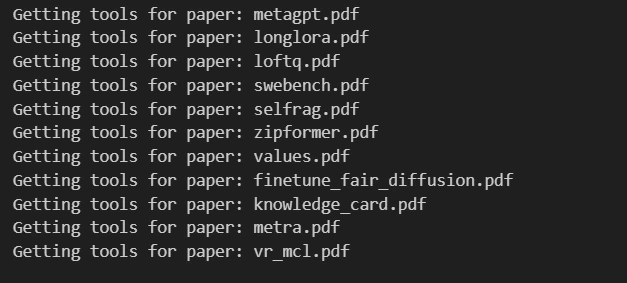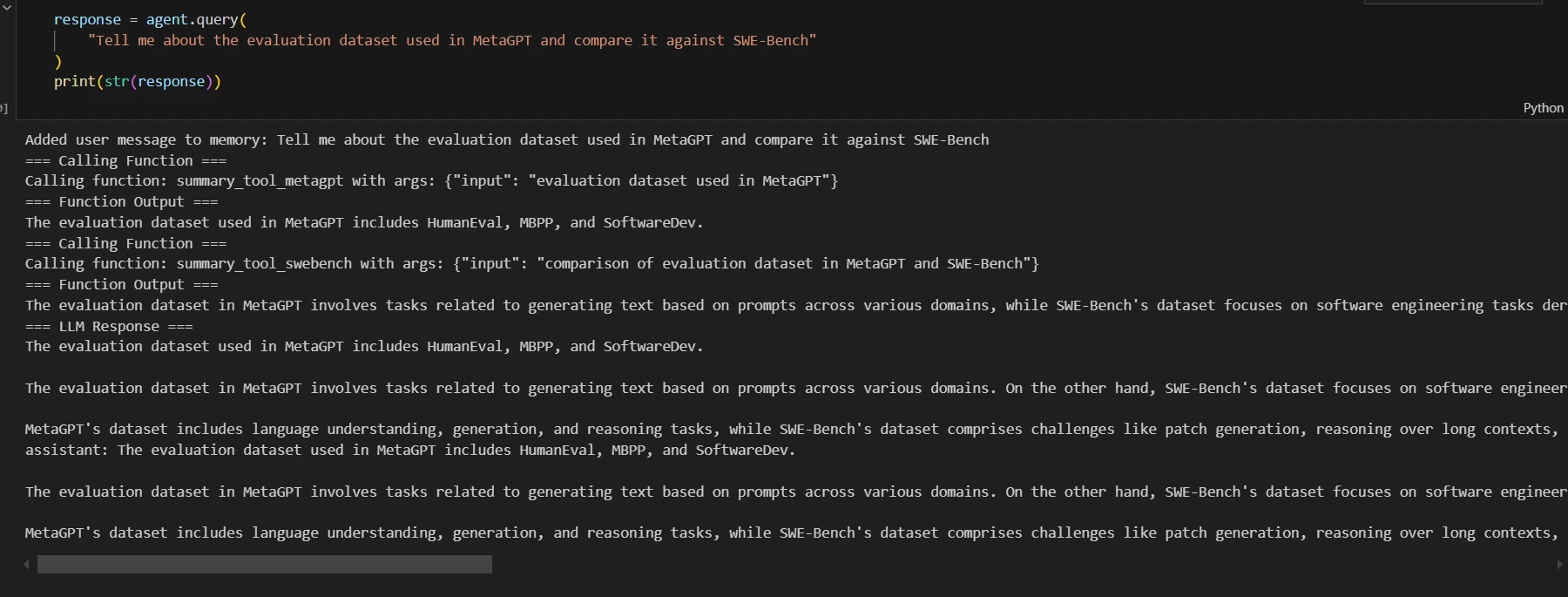Introduction
In my earlier weblog publish, Constructing Multi-Doc Agentic RAG utilizing LLamaIndex, I demonstrated tips on how to create a retrieval-augmented technology (RAG) system that would deal with and question throughout three paperwork utilizing LLamaIndex. Whereas that was a robust begin, real-world functions typically require the power to deal with a bigger corpus of paperwork.
This weblog will deal with scaling that system from three paperwork to eleven and past. We’ll dive into the code, challenges of scaling, and tips on how to construct an environment friendly agent that may dynamically retrieve info from a bigger set of sources.
Studying Goals
- Perceive scaling Multi-Doc Agentic RAG system from dealing with a number of paperwork to over 10+ paperwork utilizing LLamaIndex.
- Discover ways to construct and combine tool-based question mechanisms to boost RAG fashions.
- Perceive the usage of VectorStoreIndex and ObjectIndex in effectively retrieving related paperwork and instruments.
- Implement a dynamic agent able to answering advanced queries by retrieving related papers from a big set of paperwork.
- Establish the challenges and greatest practices when scaling RAG programs to a number of paperwork.
This text was printed as part of the Information Science Blogathon.
Key Steps Concerned
Within the earlier weblog, I launched the idea of Agentic RAG—an strategy the place we mix info retrieval with generative fashions to reply consumer queries utilizing related exterior paperwork. We used LLamaIndex to construct a easy, multi-document agentic RAG, which might question throughout three paperwork.
The important thing steps concerned:
- Doc Ingestion: Utilizing SimpleDirectoryReader to load and cut up paperwork into chunks.
- Index Creation: Leveraging VectorStoreIndex for semantic search and SummaryIndex for summarization.
- Agent Setup: Integrating OpenAI’s API to reply queries by retrieving related chunks of knowledge from the paperwork.
Whereas this setup labored properly for a small variety of paperwork, we encountered challenges in scalability. As we expanded past three paperwork, points like instrument administration, efficiency overhead, and slower question responses arose. This publish addresses these challenges.
Key Challenges in Scaling to 10+ Paperwork
Scaling to 11 or extra paperwork introduces a number of complexities:
Efficiency Concerns
Querying throughout a number of paperwork will increase the computational load, particularly by way of reminiscence utilization and response occasions. When the system processes a bigger variety of paperwork, making certain fast and correct responses turns into a main problem.
Instrument Administration
Every doc is paired with its personal retrieval and summarization instrument, which means the system wants a sturdy mechanism to handle these instruments effectively.
Index Effectivity
With 11 paperwork, utilizing the VectorStoreIndex turns into extra advanced. The bigger the index, the extra the system must sift by to search out related info, doubtlessly rising question occasions. We’ll focus on how LLamaIndex effectively handles these challenges with its indexing methods.
Implementing the Code to Deal with 10+ Paperwork
Let’s dive into the implementation to scale our Agentic RAG from three to 11 paperwork.
Doc Assortment
Listed below are the 11 papers we’ll be working with:
- MetaGPT
- LongLoRA
- LoFT-Q
- SWE-Bench
- SelfRAG
- Zipformer
- Values
- Finetune Truthful Diffusion
- Data Card
- Metra
- VR-MCL
Step one is to obtain the papers. Right here’s the Python code to automate this:
urls = [
"https://openreview.net/pdf?id=VtmBAGCN7o",
"https://openreview.net/pdf?id=6PmJoRfdaK",
"https://openreview.net/pdf?id=LzPWWPAdY4",
"https://openreview.net/pdf?id=VTF8yNQM66",
"https://openreview.net/pdf?id=hSyW5go0v8",
"https://openreview.net/pdf?id=9WD9KwssyT",
"https://openreview.net/pdf?id=yV6fD7LYkF",
"https://openreview.net/pdf?id=hnrB5YHoYu",
"https://openreview.net/pdf?id=WbWtOYIzIK",
"https://openreview.net/pdf?id=c5pwL0Soay",
"https://openreview.net/pdf?id=TpD2aG1h0D"
]
papers = [
"metagpt.pdf",
"longlora.pdf",
"loftq.pdf",
"swebench.pdf",
"selfrag.pdf",
"zipformer.pdf",
"values.pdf",
"finetune_fair_diffusion.pdf",
"knowledge_card.pdf",
"metra.pdf",
"vr_mcl.pdf"
]
# Downloading the papers
for url, paper in zip(urls, papers):
!wget "{url}" -O "{paper}"Instrument Setup
As soon as the paperwork are downloaded, the subsequent step is to create the instruments required for querying and summarizing every doc.
from llama_index.core import SimpleDirectoryReader, VectorStoreIndex, SummaryIndex
from llama_index.core.node_parser import SentenceSplitter
from llama_index.core.instruments import FunctionTool, QueryEngineTool
from llama_index.core.vector_stores import MetadataFilters, FilterCondition
from typing import Checklist, Non-compulsory
def get_doc_tools(
file_path: str,
title: str,
) -> str:
"""Get vector question and abstract question instruments from a doc."""
# load paperwork
paperwork = SimpleDirectoryReader(input_files=[file_path]).load_data()
splitter = SentenceSplitter(chunk_size=1024)
nodes = splitter.get_nodes_from_documents(paperwork)
vector_index = VectorStoreIndex(nodes)
def vector_query(
question: str,
page_numbers: Non-compulsory[List[str]] = None
) -> str:
"""Use to reply questions over a given paper.
Helpful when you have particular questions over the paper.
At all times depart page_numbers as None UNLESS there's a particular web page you need to seek for.
Args:
question (str): the string question to be embedded.
page_numbers (Non-compulsory[List[str]]): Filter by set of pages. Go away as NONE
if we need to carry out a vector search
over all pages. In any other case, filter by the set of specified pages.
"""
page_numbers = page_numbers or []
metadata_dicts = [
{"key": "page_label", "value": p} for p in page_numbers
]
query_engine = vector_index.as_query_engine(
similarity_top_k=2,
filters=MetadataFilters.from_dicts(
metadata_dicts,
situation=FilterCondition.OR
)
)
response = query_engine.question(question)
return response
vector_query_tool = FunctionTool.from_defaults(
title=f"vector_tool_{title}",
fn=vector_query
)
summary_index = SummaryIndex(nodes)
summary_query_engine = summary_index.as_query_engine(
response_mode="tree_summarize",
use_async=True,
)
summary_tool = QueryEngineTool.from_defaults(
title=f"summary_tool_{title}",
query_engine=summary_query_engine,
description=(
f"Helpful for summarization questions associated to {title}"
),
)
return vector_query_tool, summary_toolThis perform generates vector and abstract question instruments for every doc, permitting the system to deal with queries and generate summaries effectively.
Now we are going to improve agentic RAG with instrument retrieval.
Constructing the Agent
Subsequent, we have to prolong the agent with the power to retrieve and handle instruments from all 11 paperwork.
from utils import get_doc_tools
from pathlib import Path
paper_to_tools_dict = {}
for paper in papers:
print(f"Getting instruments for paper: {paper}")
vector_tool, summary_tool = get_doc_tools(paper, Path(paper).stem)
paper_to_tools_dict[paper] = [vector_tool, summary_tool]
all_tools = [t for paper in papers for t in paper_to_tools_dict[paper]]Output will appear to be under:

Instrument Retrieval
The subsequent step is to create an “object” index over these instruments and construct a retrieval system that may dynamically pull the related instruments for a given question.
from llama_index.core import VectorStoreIndex
from llama_index.core.objects import ObjectIndex
obj_index = ObjectIndex.from_objects(
all_tools,
index_cls=VectorStoreIndex,
)
obj_retriever = obj_index.as_retriever(similarity_top_k=3)Now, the system can retrieve essentially the most related instruments based mostly on the question.
Let’s see an instance:
instruments = obj_retriever.retrieve(
"Inform me concerning the eval dataset utilized in MetaGPT and SWE-Bench"
)
#retrieves 3 objects, lets see the third one
print(instruments[2].metadata)
Agent Setup
Now, we combine the instrument retriever into the agent runner, making certain it dynamically selects one of the best instruments to reply to every question.
from llama_index.core.agent import FunctionCallingAgentWorker
from llama_index.core.agent import AgentRunner
agent_worker = FunctionCallingAgentWorker.from_tools(
tool_retriever=obj_retriever,
llm=llm,
system_prompt="""
You're an agent designed to reply queries over a set of given papers.
Please all the time use the instruments offered to reply a query. Don't depend on prior data.
""",
verbose=True
)
agent = AgentRunner(agent_worker)Querying Throughout 11 Paperwork
Let’s see how the system performs when querying throughout a number of paperwork. We’ll question each the MetaGPT and SWE-Bench papers to match their analysis datasets.
response = agent.question("Inform me concerning the analysis dataset utilized in MetaGPT and examine it towards SWE-Bench")
print(str(response))
Output:

Let’s see different instance
response = agent.question(
"Examine and distinction the LoRA papers (LongLoRA, LoftQ). Analyze the strategy in every paper first. "
)
print(str(response))
Output:

Outcomes and Efficiency Insights
We’ll now discover the outcomes and efficiency insights under:
Efficiency Metrics
When scaling to 11 paperwork, the efficiency remained sturdy, however we noticed a rise in question occasions by roughly 15-20% in comparison with the 3-document setup. The general retrieval accuracy, nevertheless, stayed constant.
Scalability Evaluation
The system is very scalable due to LLamaIndex’s environment friendly chunking and indexing. By rigorously managing the instruments, we had been in a position to deal with 11 paperwork with minimal overhead. This strategy could be expanded to assist much more paperwork, permitting additional development in real-world functions.
Conclusion
Scaling from three to 11+ paperwork is a major milestone in constructing a sturdy RAG system. This strategy leverages LLamaIndex to handle massive units of paperwork whereas sustaining the system’s efficiency and responsiveness.
I encourage you to attempt scaling your personal retrieval-augmented technology programs utilizing LLamaIndex and share your outcomes. Be happy to take a look at my earlier weblog right here to get began!
Key Takeaways
- It’s doable to scale a Retrieval-Augmented Technology (RAG) system to deal with extra paperwork utilizing environment friendly indexing strategies like VectorStoreIndex and ObjectIndex.
- By assigning particular instruments to paperwork (vector search, abstract instruments), brokers can leverage specialised strategies for retrieving info, enhancing response accuracy.
- Utilizing the AgentRunner with instrument retrieval permits brokers to intelligently choose and apply the appropriate instruments based mostly on the question, making the system extra versatile and adaptive.
- Even when coping with numerous paperwork, RAG programs can keep responsiveness and accuracy by retrieving and making use of instruments dynamically, somewhat than brute-force looking all content material.
- Optimizing chunking, instrument task, and indexing methods are essential when scaling RAG programs to make sure efficiency and accuracy.
Steadily Requested Questions
A. Dealing with 3 paperwork requires easier indexing and retrieval processes. Because the variety of paperwork will increase (e.g., to 10+), you want extra subtle retrieval mechanisms like ObjectIndex and power retrieval to take care of efficiency and accuracy.
A. VectorStoreIndex helps in environment friendly retrieval of doc chunks based mostly on similarity, whereas ObjectIndex lets you retailer and retrieve instruments related to totally different paperwork. Collectively, they assist in managing large-scale doc units successfully.
A. Instrument-based retrieval allows the system to use specialised instruments (e.g., vector search or summarization) to every doc, enhancing the accuracy of solutions and decreasing computation time in comparison with treating all paperwork the identical method.
A. To deal with extra paperwork, you possibly can optimize the retrieval course of by fine-tuning the indexing, utilizing distributed computing methods, and doubtlessly introducing extra superior filtering mechanisms to slender down the doc set earlier than making use of instruments.
A. Scaling Multi-Doc Agentic RAG programs successfully entails optimizing knowledge retrieval strategies, implementing environment friendly indexing methods, and leveraging superior language fashions to boost question accuracy. Using instruments like LLamaIndex can considerably enhance the system’s efficiency by facilitating higher administration of a number of paperwork and making certain well timed entry to related info.
The media proven on this article is just not owned by Analytics Vidhya and is used on the Writer’s discretion.